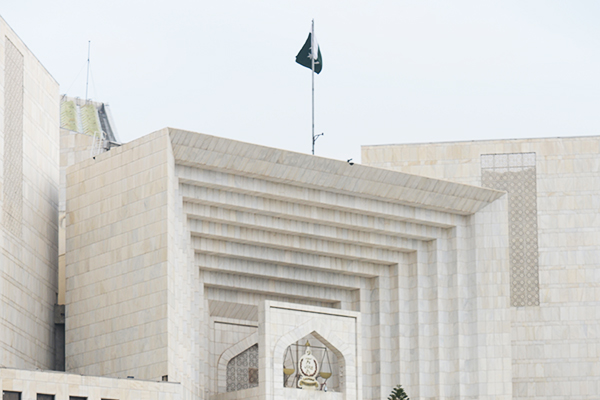
Farooq Naeem—AFP
Pakistan’s legal fraternity on Wednesday urged the government to legislate a regulatory mechanism for the Supreme Court, especially the chief justice’s authority to unilaterally constitute benches and fix cases.
In a statement issued after a joint meeting of the Supreme Court Bar Association (SCBA); the Pakistan Bar Council; high court bar associations and bar councils of all provinces; and nominees of bar councils to the Judicial Commission of Pakistan (JCP), they maintained a desire for strict adherence to the rule of law and principles of seniority. In this regard, they rejected nominations for the appointment of junior judges to the Supreme Court in violation of seniority principle and passed resolutions demanding the federal government legislate—under Articles 175(2) and 191 of the Constitution—to regulate the Supreme Court’s jurisdiction, in particular ending the CJP’s sole discretion to constitute benches, fix cases and initiate suo motu proceedings. Instead, the legal fraternity proposed, these powers should be placed with a committee comprising the five senior-most judges of the court.
Chaired by SCBA President Ahsan Bhoon and PBC Executive Chairman Pir Muhammad Masood Chishti, the meeting was convened to deliberate on the controversy provoked by a scheduled meeting of the JCP that has been criticized by Justice Qazi Faez Isa as being in violation of the Constitution. The participants said the JCP’s rules must be amended to allow any member of the forum to submit nominations for judicial appointments against the policy of the chief justice alone proposing nominees. The existing policy, they stressed, was in violation of Article 175A of the Constitution, adding that fair, transparent and objective criteria and procedures should be formulated to gauge the suitability of nominees.
According to the lawyers’ community, the government should amend Article 175A and Article 209 of the Constitution to centralize the appointment and removal of judges, making the process more inclusive by including representation of all stakeholders i.e. judges, bar, executive and Parliament. The meeting said Article 184(3) of the Constitution should also be amended to provide a right of appeal, adding that the curative review filed against Justice Qazi Faez Isa should also be withdrawn, as the ousted PTI had already admitted it was wrongly filed.
On existing Supreme Court rules, the forum said they should be amended to ensure review petitions were heard by a bench different than the original bench, while also allowing people to engage different counsels. In a subsequent press conference, SCBA President Bhoon said the elevation of judges to superior courts was not an election and should be strictly in accordance with the principle of seniority. He said appointing or nominating junior judges to the higher judiciary suggested some judges were being ignored, adding the Supreme Court’s ruling declaring the Punjab Assembly deputy speaker’s ruling on the chief minister’s election had been made controversial because the opinion of eight judges in a ruling of 2015 could not be ignored.
Separately, the Sindh Bar Council sent a letter to CJP Umar Ata Bandial and other JCP members, urging them to postpone today’s (Thursday) meeting of the JCP and reconvene at a later date to consider only the senior-most judges for elevation to the Supreme Court. Similarly, the Sindh High Court Bar Association moved a resolution calling for a strike of proceedings over the SC’s failure to adhere to the principle of seniority for appointing judges.
